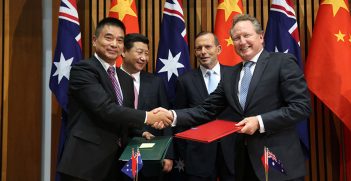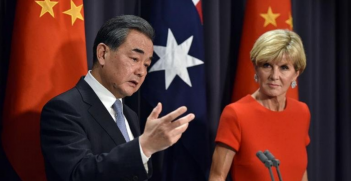Australia’s Foreign Relations Bill: A Misguided Attack on Subnational Diplomacy

There is nothing sinister in the federal government’s desire to control Australia’s foreign policy. However, proposed legislation to scrutinise “arrangements” between foreign governments and Australia’s states, localities, and public universities fails to recognise the role of subnational actors in promoting economic opportunities and increasing diplomatic engagement.
Scott Morrison has proposed legislation that would give the federal government the ability to regulate all agreements that Australian states, territories, councils and public universities make with foreign governments. The bill, if passed, would give the foreign minister exclusive rights to veto all existing and future “arrangements.”
The federal government has justified the legislation in terms of its desire to ensure that Australia “speak with one voice.” And under the Australian constitution, the external affairs power rightly lies solely with the federal government. However, state and federal tension during the COVID-19 pandemic and growing hysteria toward China have likely played as much a role in its development as concerns over Australia’s foreign policy coherence. Given these tensions, there are very real concerns that if the legislation is passed, decisions to scrap existing and future deals will be motivated by political, not pragmatic, considerations. Reports in August that Josh Frydenberg stopped a Chinese bidder from acquiring a dairy and drinks manufacturing company from a Japanese owner, seemingly without explanation as to why it was deemed a threat to the national interest, certainly doesn’t instil confidence.
Global Actors: Australia’s States and Territories
There is little doubt that Australia’s states and territories are global actors. Indeed, the scope of Australia’s subnational diplomacy is vast and reflects the increasingly vital links between state economies and Australia’s neighbours in the Asia-Pacific region.
Recent research by Asialink revealed the extent to which Australia’s states and territories have become globally connected. Victoria, for example, has established its own independent agency, Global Victoria, to pursue strategic partnerships with foreign governments, and help Victorian businesses to become more competitive in international markets. Additionally, the Victorian government has established engagement strategies for China, India, and Southeast Asia.
States have also engaged in large infrastructure projects that aim to increase economic competitiveness. Queensland, for example, has revealed an ambitious scheme to install a 550-kilometer undersea fibre optic cable that, once complete, would allow Queensland businesses to bypass Sydney and connect directly with Asia.
The research revealed that 98 trade and investment offices have been strategically positioned around the world to promote state capabilities to affluent international markets. Moreover, sister-state and sister-city relationships are numerous and have established government-to-government links which foster greater opportunities for Australian businesses.
These relationships are only more important now that Australia faces its first recession in nearly 30 years. Collaborating with governments in the Asia-Pacific to help stimulate the region’s economic recovery will be vital for ensuring the return of a stable and prosperous region, which benefits Australia greatly. However, the proposed legislation, if passed, would send the wrong message to the states and territories at a time when Australia needs to capitalise on these relationships the most.
Diversification of the Australian economy
Sources have suggested that Victoria’s controversial Belt and Road Initiative (BRI) memorandum of understanding (MoU) with China would be one of the first arrangements to be scrapped under the proposed legislation. The MoU, despite being a non-binding document, has been slammed by Prime Minister Scott Morrison for being “inconsistent with the Australian government’s policy.” This is despite the fact the federal government too has signed its own agreement with China to cooperate on BRI projects in third party countries. However, it has refused to reveal the text of the agreement signed in September 2017. Yet, while the legislation would indeed give the Australian government the power to scrap Victoria’s BRI deal, it would also serve to discourage Australia’s subnational actors from engaging with other foreign governments, which is key to Australia lessening its reliance on China.
Increasing spates of geopolitical tension with China have led many analysts to call for Australia to diversify its economy. While China will remain a critical trading partner, the federal government has demonstrated its commitment to sourcing new markets for Australian businesses. For example, Scott Morrison’s visit to Vietnam in 2019 – the first by an Australian leader in 25 years – sent a strong signal that Australia is now focused on developing its relationship with the growing Southeast Asian nation.
This trend has been recognised by Australia’s states and territories too. Victoria and New South Wales have developed ASEAN engagement strategies that aim to increase economic engagement with countries in the region. Western Australia, a state inextricably linked with China due to its resource exports, has also committed to diversifying its economy by establishing Diversify WA, an economic development framework which seeks to diversify the state’s economy in six of its most important sectors.
Just over two weeks after Morrison announced the proposed legislation, Western Australia inked an MoU with Ba Ria-Vung Tau Province, one of Vietnam’s most prosperous and fast-growing industrial regions. Minister for Asian Engagement Peter Tinley stated that the agreement formed part of the state’s Asian Engagement Strategy 2019-2030 and would “diversify the economy and create jobs for WA.” Vietnam has been identified as an ideal partner for WA’s export opportunities in food, education, mining, and oil and gas services.
Clearly, this type of engagement will be crucial to the success of a strong and diverse Australian economy. Yet, in passing legislation which targets subnational engagement, the federal government will only hamper its ability to foster new and important relationships in the region.
Where to from here?
Much of the discussion over the proposed legislation has been focused on ensuring the consistency of Australian foreign policy. Fear of a disconnect between state and federal foreign policy, with Victoria’s BRI deal cited most often, may have motivated the legislation in part. However, unsolicited control over the international engagement of sub-national actors goes beyond the requirements of a consistent foreign policy and is more reflective of exaggerated claims of Chinese influence.
The federal government’s frustration with the states and territories during the COVID-19 pandemic has also demonstrated the difficulties of Australia’s federal governance. But where there may lie difficulties, there also lie significant opportunities to increase Australia’s international engagement. Australia’s states and territories have proven to be key actors in delivering on Australia’s aims to develop and maintain a strong and diverse economy.
It is therefore critical that the federal government does not lose sight of the important roles played by Australia’s subnational actors. If it does, and the legislation is passed, Australia’s diplomatic and economic standing in the region will suffer.
Jeremy Costa is a current Master of International Relations student at the University of Melbourne and a former AIIA National Office intern.





